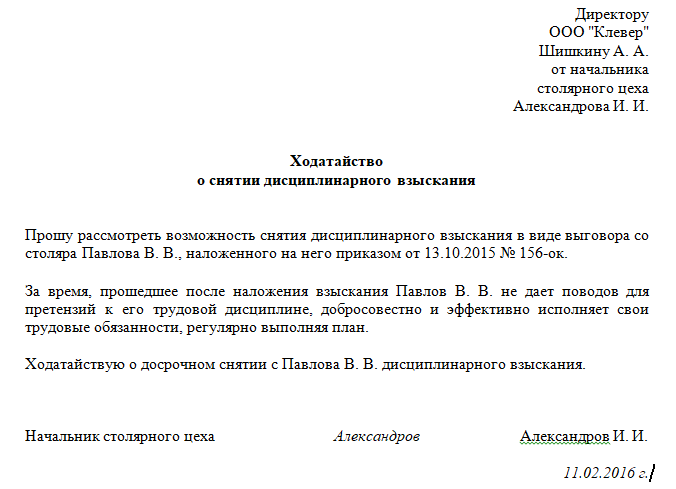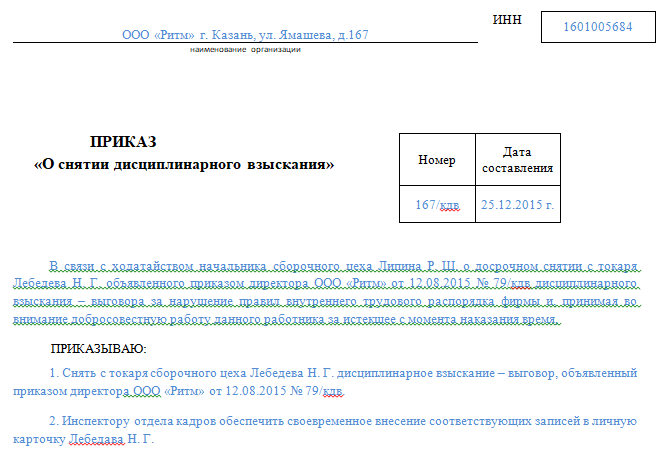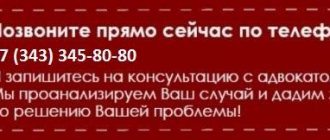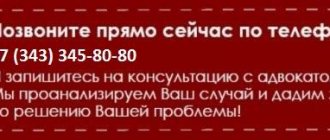Algorithm for canceling disciplinary sanctions against an employee
Article number 192 of the Labor Code of the Russian Federation states that disciplinary sanctions may be applied to an employee for violation of labor discipline. There are several types of such sanctions. Depending on the severity of the offense, they are divided into reprimand, reprimand and dismissal. The choice of type of punishment depends on the employer.
Sanctions can be expressed in the form of a reduction in the employee’s salary, temporary deprivation of bonuses and additional payments.
Article number 194 of the Labor Code of the Russian Federation indicates that the automatic removal of a penalty occurs after one year from the date of its application. To cancel the punishment, it is necessary that the employee does not commit new offenses during this period.
Types of disciplinary punishments
Based on the extent of the violation, the employee may be subject to different types of disciplinary action.
For example, being late for work may result in a written reprimand, but absenteeism twice without explanation can lead to dismissal. Punishment is also imposed for disclosure of confidential information and trade secrets, immoral behavior, violation of labor protection and safety rules, abuse of authority, etc.
Any types of disciplinary punishment (except, for obvious reasons, dismissal) can be canceled ahead of schedule. They are automatically withdrawn after a year.
Cancellation of punishment automatically
To automatically cancel a punishment, the manager does not need to prepare a special order, as with early lifting of sanctions. It is also not necessary to notify the employee of the termination of the collection. But it is extremely important for the employee himself to prevent new violations within the allotted period.
Expert opinion
Makarov Evgeniy Sergeevich
Arbitration manager with more than 10 years of experience
The person himself may be absent from the workplace at the time the sanctions are lifted from him. To be, for example, on vacation or sick leave. But this is used exclusively for such types of punishment as a reprimand or reprimand.
After the period of punishment has expired, the employee is returned to his previous salary, bonuses and incentives. He can also count on receiving a new title.
Procedure
Article 194 of the Labor Code of the Russian Federation provides that after one year after the imposition of disciplinary punishment, it is removed automatically. The employee is considered not to have been held accountable.
Remember! To remove a penalty before the one-year period, you must:
- prepare a petition for its removal;
- enlist the support of your immediate supervisor;
- prepare an order to lift the disciplinary sanction;
- familiarize the employee with the order to remove the punishment from him.
Both the manager and the employee himself can take the initiative to lift the penalty early.
Important! If this is requested by the immediate superior, the head of the trade union, the general or trade union meeting, then they are obliged to justify their decision:
- improvement of labor performance;
- absence of violations of labor and production discipline;
- compliance with internal labor regulations;
- conscientious performance of their functional duties;
- other positive traits and qualities of the employee.
Based on the results of the consideration, the manager issues an order in which the previously imposed penalty is lifted from the offending employee. The indicated person is introduced to the order against signature. If the decision to lift the penalty was made by the court, then the order indicates that it was issued in pursuance of the court verdict. If we are talking about reinstatement at work, then the corresponding entry is made in the employee’s work book.
This is also important to know:
What is disciplinary action, in what cases is it applied?
Withdrawal procedure
The procedure for early withdrawal of foreclosure involves going through the following stages:
- The employer receives a request from the employee or another party to terminate the order early.
- The application is endorsed by the employer.
- An order is issued.
- The employee is introduced to the contents of the order upon signature.
Once the disciplinary sanction is lifted, the legal consequence of this will be that the employee will no longer be considered to have been subject to sanction, and subsequent references by the employer to the already lifted sanction will have no justification.
Grounds for cancellation of penalties
An employee has the right to early cancellation of a collection order under the following circumstances:
- conscientious work during the period of validity of the order;
- fulfillment of the established work plan beyond the norm;
- participation in the life of the team;
- identification and prevention of accidents and other violations;
- introducing rationalization proposals and new techniques.
If the employee has corrected himself, the following may intercede on his behalf: the head of the enterprise or organization, the employee himself, the head of the local trade union, a guarantor from the team, the boss of the punished employee himself. The initiator of the appeal must receive a link so that he can arrange a newsletter for recipients (Article 194 of the Labor Code of the Russian Federation). The employee must read the order to lift the penalty and sign.
Removal of foreclosure automatically
Removal of a disciplinary sanction in an automatic format does not imply any additional actions on the part of the employer in the form of issuing an order or making a note in a personal file.
The Labor Code takes precedence over other special laws and local regulatory legal acts.
The employer does not have the right to independently establish a longer period of validity of the penalty (even if he specifies such conditions in the collective agreement, they will be declared invalid). But individual laws may establish shorter time frames that improve the situation of employees.
For example, for employees of the Ministry of Internal Affairs, a reprimand is valid for a month, a severe reprimand is valid for a year. For military personnel, such a form of punishment as a severe reprimand entered into a personal file has also been established, and it is valid for a year.
Period of punishment
A disciplinary sanction automatically terminates one year after it came into force. If during this period the person commits an offense again, then the first punishment is reset and a new one comes into force from the date the order is issued. It turns out that the employee will already have two punishments that will be considered repeated.
To cancel a foreclosure early, you must draw up a new order.
If during the period of sanctions an employee was transferred to another position, then this is not a reason to cancel them. A disciplinary sanction can be lifted early if a person is fired. In this case, all penalties are lifted and cease to have effect, since the person is no longer under the authority of the former employer.
Disciplinary action is valid for six months. After the end of this period, it is removed, and the employee’s violations are cleared.
Expert opinion
Makarov Evgeniy Sergeevich
Arbitration manager with more than 10 years of experience
The legislation of the Russian Federation provides for early cancellation of a disciplinary sanction. This can be done either by the employee’s immediate supervisor or by the director of the organization. Local trade unions may also apply. The employee himself also has the right to ask for the sanctions to be lifted. To cancel fines early, a new order must be drawn up. The law does not provide for specific deadlines for the cancellation of early punishment. This can only be decided by the employer personally in relation to each person.
Each employer must take a responsible approach to the imposition of a penalty and the procedure for its removal. If he violated the rules or unreasonably applied a disciplinary sanction, then the employee has the authority to restore his labor rights.
Article number 193 of the Labor Code of the Russian Federation states that a person can challenge a disciplinary sanction taken against him in the labor inspectorate or in the labor dispute commission. The last resort would be to go to court.
It is important to note that in the case of consideration of labor disputes in a judicial institution for reinstatement at work, the employer himself must prove the validity of such an action.
If violations on the part of the employer are proven, the dismissal will be considered illegal. And management will also have to pay the entire salary to the employee for the entire period of his absence. Well, as a result, the person is obliged to reinstate him in his position.
The employer is required to notify the employee of the imposition of disciplinary sanctions. If this is not done, the procedure will be considered incomplete.
The head of the enterprise has the right to remove the existing punishment at any time. The countdown of the sanctions period does not depend on the position held. If, before the cancellation of the penalty, the employee received a new rank, and in the course of his activities he again committed a violation, then it will be considered repeated.
If an employee decides to leave the company (resign), then all disciplinary sanctions imposed on him are canceled automatically. They will in no way affect a person’s new workplace, since they are a local measure applicable only to a specific organization.
Article number 194 of the Labor Code of the Russian Federation clearly states that if within one year the offending employee has not violated labor discipline, then the penalty against him will be automatically lifted. You don't need to take any action to do this.
A person has the right to be fired if he does not fully fulfill his duties during the period of sanctions.
The right to choose a specific disciplinary sanction rests with the employer himself. He can fire him immediately after issuing a reprimand or give him a chance to reform.
Validity
A disciplinary sanction is considered lifted if a year has passed since the issuance of the order. If, before the expiration of this period, the violator was subjected to a second punishment, the period of the first one is reset and begins to be counted anew from the date of imposition of the second one (commentary to Article 194 of the Labor Code of the Russian Federation). Thus, two penalties will already be recorded on the employee’s account, which gives grounds to classify them as repeated violations.
Some facts
If a disciplinary sanction is lifted early, the employer must issue an order. If the foreclosure is lifted “automatically” after the expiration of the “expiration date”, no registration will be required.
This circumstance provides the manager with the opportunity to use an extreme measure of influence - dismissal (clause 5, part 1, article 81 of the Labor Code of the Russian Federation). It is clear that dismissal under an article has the most negative impact on an employee’s career.
A change of position does not affect the course of the term. If an employee is transferred to another job within the same enterprise, the penalty will not be cancelled. The problem of how to remove a disciplinary sanction early is resolved in the event of dismissal, when all unresolved penalties cease to apply, since the influence of the manager extends only within the organization under his control.
Period for canceling disciplinary action against an employee
Article number 194.2 of the Labor Code of the Russian Federation states that the employer has the authority to early cancel the sanctions imposed on its employee. This may happen in the following cases:
- The head of the enterprise noticed the corrections made by the offending employee, thereby deciding to lift the sanctions.
- The employee independently asked for the cancellation of the penalty.
- The immediate superior decided to file a petition on behalf of his subordinate.
- The union drew up a collective appeal to cancel the penalty.
Deadlines and procedure for appealing
By default, the deadline for appealing a penalty is 3 months from the date of its imposition. But if the form of punishment is dismissal, then the deadline for declaring it illegal is shorter and amounts to 1 month.
The procedure for appealing a disciplinary sanction order depends on the authority to which the employee appealed . If this is a labor dispute commission, then after an employee submits a written petition to it, within 10 days it must consider it and issue an official verdict.
When an employee contacts the state labor inspectorate, inspectors issue an order to the employer to cancel the order if they find obvious signs of violation of labor laws.
The imposed disciplinary sanction may also be appealed in court.
Disputes regarding the removal of disciplinary sanctions are within the jurisdiction of courts of general jurisdiction and are considered in civil proceedings. According to the provisions of the Code of Civil Procedure of the Russian Federation, an employee files claims for labor disputes at his place of residence on the basis of Part 6.3 of Art. 29 of the Code of Civil Procedure or the place of fulfillment of his obligations under the employment contract under Art. 28 Code of Civil Procedure. Jurisdiction of cases can be specified in the employment contract.
Based on paragraphs. 1 clause 1 art. 333.36 of the Tax Code, an employee is not required to pay a state fee for considering labor issues in court.
If the court decides to recognize the disciplinary sanction order as illegal, the employer must cancel it and issue an order canceling the order. Also, based on the results, the employee may be reinstated at work and the employer may be required to compensate the employee for losses associated with illegal removal from work, as well as pay him wages for the entire period and compensation for delays in payment.
When filing claims, the statute of limitations must be taken into account , but they apply only at the request of one of the parties. For example, if an employee was illegally fired, he can appeal this within a month. But he has the right to file a claim to appeal the dismissal later: it will be considered on its merits, unless the employer submits a motion to miss the deadline. In some cases, missed deadlines can be restored if they were missed for a good reason (for example, due to the employee’s illness or being on a business trip).
Thus, the Labor Code in Art. 194 establishes two ways to remove a disciplinary sanction: automatic upon expiration and early. In the first case, the penalty is lifted after 1 year has passed from the moment it was imposed. But the employer, on his own initiative, can remove it ahead of schedule, or an employee, trade union or department head can approach him with such an initiative. Early repayment of a penalty can be considered as a form of incentive for the employee, and the decision on it is made at the discretion of the employer. An order issued by the employer to impose a disciplinary sanction can be appealed with the help of the prosecutor's office, the state labor inspectorate or specialized commissions for labor disputes at the enterprise. A judicial procedure for resolving controversial issues is also allowed. The deadline for appeal is generally 3 months, and in case of illegal dismissal - 1 month.
Exceptional cases
Everyone should understand that the concept of a “severe reprimand” with its entry into the work book applies exclusively to military personnel or employees of the Ministry of Internal Affairs. For all other citizens, there is only the concept of “reprimand”. Such collection lasts one year. But absolutely every company manager has the right to early lifting of sanctions.
Recovery period
Exactly one year must pass from the moment the disciplinary sanction was imposed. After which it is subject to automatic cancellation. The punishment can be reduced at the request of management, but increasing its term is unacceptable, since this is contrary to the Labor Code of the Russian Federation.
If an employee is a persistent violator of labor discipline, then the employer has the authority to fire such a person.
Military personnel and employees of the Ministry of Internal Affairs have a wider list of types of penalties. The most severe is demotion or early dismissal.
Civilian workers have a simpler collection scheme. But absolutely all of them have the authority to defend their rights and interests in court.
Article number 81.5 of the Labor Code of the Russian Federation states that the employer has the right to part with the violator after the first reprimand. The basis for this may be the dishonest performance of one’s professional duties. And if the employee already has an unfinished penalty, then management can, instead of an order, immediately issue an application for termination of the employment relationship.
Everyone understands that a person can be fired for a one-time malicious violation of labor discipline. But an employee cannot be fired immediately after being reprimanded. If a penalty has already been imposed on him, then he cannot be fired for the same offense.
Service in law enforcement agencies
All persons undergoing military service are guided by knowledge of the legislative framework. But since military personnel do not work, but serve, more stringent disciplinary measures are applied to them. The list of types of sanctions includes a severe reprimand. This is a kind of final warning, followed by serious measures.
Severe reprimand threatens:
- Notification of incomplete compliance with the position held.
- Demotion.
- Dismissal from the structure.
Military service
Persons serving in the army also face serious liability. For any offenses committed, they face loss of dismissal or even administrative arrest. The imposed penalty is noted in the personal file of the offender within seven days.
The law states that the day when a violation of labor discipline is discovered is considered the day when the violator’s manager learned about it. It does not matter here whether this leader can apply sanctions or not.
If the boss finds out about a violation of labor discipline thirty days later, then it will no longer be possible to impose a penalty.
It is no longer possible to apply penalties here, and the employer himself may be held accountable and subject to heavy fines.
- Violations that are in no way related to the employee’s professional activities.
- If the sad consequences are not related to the employee.
- If there is no connection between negative consequences and human activities.
How to appeal a reprimand
| Through the employer | Court | Labor Inspectorate or Trade Union | |
| What you will need | Oral or written request | A claim with a description of the circumstances and copies of all documents related to the case | Written complaint and copy of the order to issue a reprimand |
| Deadlines | During the year while the disciplinary action is in effect | 1 month from the date of drawing up the reprimand order | |
During legal proceedings, it is recommended to enlist the support of at least two witnesses who can confirm innocence. If everything is resolved in favor of the employee, by decision of the judicial authority the manager is obliged to issue an order to cancel the order of reprimand, and then the disciplinary sanction will be extinguished.
The statement of claim to the court must contain the following information:
- Name of the enterprise, position, circumstances.
- Request to cancel the disciplinary action.
Attached to the document is a copy of the hiring order, an employment agreement, the plaintiff’s job description and a copy of the reprimand order. If desired, the employee may demand that the manager pay compensation for moral damage.
Example 1, when the employer is right. Agafonova V.I. I was 15 minutes late for work every day. At first, the manager made several comments to her, then, on the fifth time she was late, he demanded an explanatory note from her. She indicated that she was late due to a transport problem. This is not a reason for not applying penalties, because the employee is obliged to independently think through how to get there on time, therefore Agafonova V.I. was reprimanded.
Example 2, when the employer is wrong. Zharova N.N. came to work 2 hours later than the scheduled time, explaining that she got into an accident on the way and had to wait for the traffic police. The circumstances are indicated in the explanatory note, but the manager considered it necessary to issue a reprimand. The situation is respectful, therefore Zharova N.N. I contacted the labor inspectorate, and after an inspection the penalty was lifted.
Algorithm for removing foreclosure
The procedure consists of several steps:
- Receipt by the manager of a petition to remove the disciplinary sanction.
- Signing of the application by the head of the organization.
- Formation of an order.
- Notification of the employee with an order signed by him.
How to make a petition?
The following items must be included in the application:
- Full name of the person submitting the document.
- Document title: petition to lift a disciplinary sanction.
- Full name of the offender, position and department.
- Type of punishment.
- Request to cancel sanctions against the culprit.
- Signature of the applicant or applicants.
Making an order
An order for early termination of sanctions can also be issued arbitrarily, but it must contain the following information:
- Name of the organization.
- Order number.
- Date and place of drawing up the order.
- Date of sentencing.
- Type of recovery and details of the order regarding it.
- Reason for placing the order.
- Reasons for issuing the document.
A sample order to lift a disciplinary sanction is available
Early withdrawal
The Labor Code does not regulate the removal of a disciplinary sanction early. In this situation, you can rely on Art. 191 of the Labor Code of the Russian Federation, which represents conscientious performance of duties as a sufficient reason for issuing an incentive. It is in this capacity that the annulment of a sentence before its expiration can be used.
The legislation does not define a minimum period for its initiation, which leaves this decision at the discretion of the manager.
Base
The offender is able to atone for his guilt:
- flawless operation for a long time;
- exceeding planned indicators;
- active participation in public works;
- the invention of innovative methods that contribute to the rationalization of the labor process;
- preventing an emergency or accident.
The types of disciplinary sanctions are described here.
Initiators
Early withdrawal of foreclosure can be initiated:
- director of the organization;
- violator;
- the employee's immediate superior;
- chairman of the trade union;
- representative of the workforce.
It is best to provide a link to the initiator of the appeal, to Article 194 of the Labor Code, indicating the recipients of the mailing. The employee must read and sign the order to lift the disciplinary sanction.
Registration of withdrawal
If the decision to eliminate the punishment is made by the director, it is enough to issue a corresponding order to implement it. In all other cases, a petition is first submitted in his name.
Memo on the removal of a disciplinary sanction, sample:
The following must be familiar with the order:
- worker;
- author of the petition;
- HR department employee.
The fact of cancellation of the collection is reflected in the T-2 card. In this case, the number of the order and the date of its issue are indicated. If the employee commits a new offense after the order is issued, the lifted penalty will not be extended. It is also not taken into account when determining the repetition of a violation.
Disciplinary sanctions are detailed in the video below.
Petition
The petition is written to the director, whose position and full name are indicated in the upper right corner. Its contents mention:
- the reason for applying disciplinary measures;
- grounds for liquidation of foreclosure;
- request to cancel the punishment;
- Full name of the employee;
- number and date of the order that imposed the penalty.
The petition is certified by the signatures:
- Immediate superior (foreman, foreman).
- Chairman of the trade union committee. Supported by the number of the minutes of the meeting and the date of its holding.
- A representative of the labor collective, selected by voting at a general meeting. The number and date of the protocol are also indicated.
Petition to lift a disciplinary sanction, sample

Order
There is no standard form for the order; its execution is carried out in accordance with the internal rules of the company. It should contain:
- release number and date;
- Business name;
- Full name of the employee, position held by him, name of the department;
- grounds for annulment of punishment;
- executive visa;
- introductory line.
Order to lift a disciplinary sanction, sample

How to challenge a disciplinary sanction?
An employee has the right to challenge the unlawful imposition of sanctions in the labor inspectorate or in court. In addition, he can apply for protection to the prosecutor's office. The reasons for contacting the defense authorities may be non-compliance with the process of imposing penalties, or the absence of the employee’s guilt in the violation. Violations may be as follows:
- Bringing an employee to several sanctions at once for one offense.
- Absence of a memo from the employee indicating the reasons for the violation.
- The deadlines for drawing up the order were violated.
Grounds for canceling a disciplinary sanction order
If disciplinary measures are taken by the employer, it is necessary to study the available documents. After all, this type of recovery can be appealed.
Key points to pay attention to when appealing a disciplinary sanction:
- Responsibility for someone else's work . Labor functions for non-fulfillment of which a penalty was applied were not assigned to the employee
- Good reasons . If a violation of labor functions or internal labor rules was not the fault of the employee (for example, being late for work due to an accident involving the employee)
- The employee was not asked for an explanation . Explanations must be in writing. The employee may refuse to provide an explanation. Lack of explanation cannot be grounds for canceling a penalty. If the employee refuses to provide explanations, the employer is obliged to draw up a statement of refusal to provide explanations. The lack of explanations from the employee and the simultaneous absence of an act of refusal to give explanations will be grounds for canceling the imposed penalty.
- One disciplinary sanction may be imposed for one offense
- The deadlines for bringing to disciplinary liability were violated
IMPORTANT : the application of disciplinary sanctions is strictly regulated and limited in time:
- month from the date of discovery of the offense for prosecution
- two days for the employee to give an explanation for the misconduct
- two days after not receiving an explanation from the employee to issue a certificate of refusal of explanation,
- three days to familiarize the employee with the order to impose a penalty,
- If the misconduct is discovered after an audit or inspection, the period for bringing to responsibility is increased to 6 months.
USEFUL : order a complaint against your employer from our lawyer in order to restore your rights as an employee
Dispute period and algorithm
A person has the right to appeal a decision within three months from the date it comes into force. If an employee has been fired, he must contact the protection authorities within a month. If he decides to contact the labor dispute inspectorate, then after submitting the application he must be given an answer within ten days.
If a person contacts the labor inspectorate, then the inspectors, in the course of identified violations, must issue an order to the employer to cancel the penalty. In addition, the employee has the right to go to court.
Appeal
As Art. 193 of the Labor Code of the Russian Federation, an employee who does not agree with the manager’s decision has the right to appeal it to:
- Labor Dispute Commission established at the enterprise. Its composition includes officials and employees in equal proportions.
- State Labor Inspectorate.
- Court.
A copy of the application with a note of acceptance remains with the employee. It is better if he provides convincing arguments in favor of his point of view, supported by specific articles of the Labor Code of the Russian Federation. However, it is the responsibility of the employer to justify the punishment imposed. At least a month is allotted for the investigation of the case, during which the punishment is suspended. As a result, two options are possible:
- Refusal to satisfy the complaint due to the absence of violations of the Labor Code.
- An order to the company to cancel the collection.









